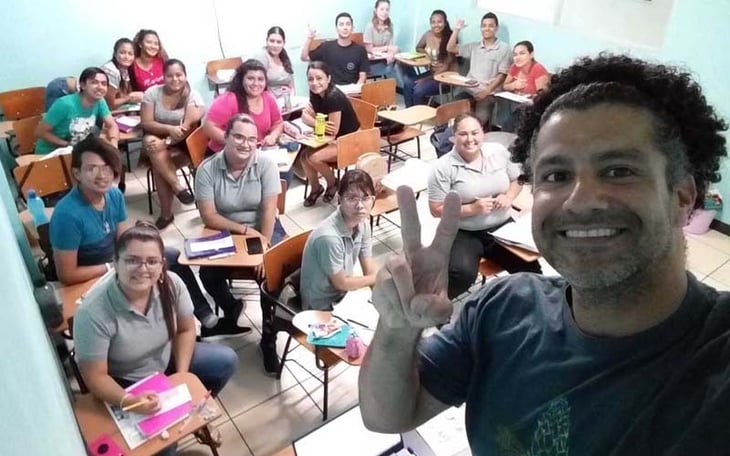A 6-Step Plan to Get a Job Teaching English in Costa Rica in 2024
Wondering how to find TEFL jobs in Costa Rica? We've devised a 6-step plan to help you teach English in Costa Rica in 2024!
Written By: Lynda Galea | Updated: July 22, 2024
Written By: Lynda Galea
Updated: July 22, 2024

Known for its lush rainforests, world-class beaches, low cost of living, and warm hospitality of its people, Costa Rica represents one of the hottest job markets in Latin America for TEFL-certified teachers. With it being just a short and cheap flight away from the US, it's especially popular amongst American ESL teachers.
How Do I Become an English Teacher in Costa Rica?
To get a job teaching English in Costa Rica, you must follow a number of steps, including researching your options, getting a TEFL certificate, preparing for your move overseas, applying for English teaching jobs, and applying for a tax identification number.
How to Apply as an English Teacher in Costa Rica in 2024
Now, let’s take a detailed look at the following 6 steps to help you teach English in Costa Rica:
1. Call an Advisor and Begin Your Research
Not sure where to begin? Download a copy of our essential guide to teaching English abroad & TEFL certification or give us a call at 773-634-9900 to speak with an ITA expert advisor to discuss your options and questions. All of our Admissions Advisors at ITA have spent extensive time living, traveling, and teaching English abroad. They will work with you throughout your research and will answer questions on up-to-date teaching market information, hiring procedures and timelines, average salary and living costs, education requirements, visa eligibility, and more.
If you already have been assigned to an advisor, send them an email or give them a call to set up a time to talk.
To learn more about teaching English in Costa Rica specifically, check out the following resources:
- Review ITA’s detailed Costa Rica Country Profile
- ITA's Guaranteed Job Placement Program in Costa Rica
- The Requirements for Teaching English in Costa Rica
- No Degree, No Problem: The 6 Best Countries to Teach English Without a College Degree
Additionally, check out the Costa Rica section of our blog and video library where you can discover hundreds of FAQs, Q&As, articles, and day-in-the-life alumni videos giving you a firsthand glimpse into what life teaching English in Costa Rica could look like for you!
2. Enroll in a TEFL Course
Completing an accredited TEFL certification course will provide you with the skills and qualifications needed to teach English in Costa Rica. This is a recognized qualification that thousands of schools and institutes in Costa Rica and worldwide seek and require when hiring new English teachers. Even if you are a certified or experienced teacher, unless you have a degree in TESOL, you will still want to get TEFL certified.
Because many schools in Costa Rica recruit and interview locally in Costa Rica, most ITA students take our 170-hour online TEFL course or our in-person TEFL course in Heredia, Costa Rica. Both courses are excellent options that cater to different lifestyles and timelines. Let’s take a closer look at these two options:
- 170-hour Online TEFL Course
- Part-time: This course spans 11 weeks offering you the flexibility to get TEFL certified while working or going to school full-time.
- 20 Hours of Hands-On Live Practice Teaching: This course includes a mandatory live practice teaching component that you will be expected to complete to fully prepare you for the classroom.
- One-on-one lifetime job search assistance is guaranteed whether you just graduated or are looking for a teaching position a few years down the road.
- The online TEFL class is the most cost-effective way to earn your TEFL certification.
- Heredia, Costa Rica In-Person TEFL Course
- Full-Time: This course spans 4 weeks (40+ hours a week) with required class time typically being anywhere from 6-8 hours each day.
- Classes range from 14-22 students - when the class size exceeds 14 students, students are split for the instruction portion of the class.
- Hands-On Live Practice Teaching: This course includes a mandatory live practice teaching component with local ESL students.
- Receive job search guidance in Costa Rica and one-on-one job search guidance for life!
Looking for other TEFL certification options? Check out ITA’s complete index of online and in-person TEFL courses around the world.

3. Prepare for Your Job Search & Make Travel Arrangements
ITA’s Student Affairs team will provide you with the resources, expertise, and guidance you need to get a job teaching English in Costa Rica. You will team up with your own personal Student Affairs Advisor, who can help you with the following:
- Preparing your resume and cover letter;
- Resources to connect you with recruiters, job listings, and recommended schools in Costa Rica looking to hire;
- Visa information, processes, and much, much more.
Most schools in Costa Rica conduct face-to-face interviews, meaning you will need to be on the ground and in Costa Rica to interview for jobs. Although rare, some schools will interview you in advance from your home country over Zoom.
If you plan to interview for teaching positions in person in Costa Rica, you will need to make any necessary travel arrangements, including arrangements for flights and accommodations.
4. Understand Your Visa Terms & Apply for Your Tax Identification Number
Costa Rica differs from most countries in that it allows ESL teachers to legally work on a tourist visa. This is because teachers are allowed to “sell their professional services” without needing a work visa. For Americans, Canadians, and most citizens of Western European nations, you can obtain your tourist visa upon arrival in Costa Rica.
The only caveat with a tourist visa is that it needs to be renewed every 90 days. To renew a tourist visa in Costa Rica, you will need to leave the country before your tourist visa expires by visiting a neighboring country such as Panama or Nicaragua - this is known as "border hopping". Upon entry back into Costa Rica, your passport will be stamped with a new tourist visa that will be valid for a fresh 90 days.
Tax ID Number for Teaching English in Costa Rica
Upon arrival in Costa Rica, you will need to get a tax I.D. number at the Tributación (Note: This can be done either before or after obtaining your teaching job). The Tributación is a government office that oversees income taxes in Costa Rica. Each city in Costa Rica has a branch and it is important that you register here in order to receive a tax identification number. This enables you to work legally in Costa Rica, though you will still need to leave the country every 90 days to renew your tourist visa.
Teachers in Costa Rica only have to pay taxes if they make more than $8,000 per year, so many do not end up having to pay taxes, but you still must be registered in order to work legally. It should be noted that many teachers and schools find creative ways to report just enough income to avoid paying taxes.
To receive your tax number:
- You do not need to wait until you have a job to register however, you do need to have a local address. You must visit and register at the Tributación in the same city as listed in your local address.
- Bring your passport, a copy of your passport, and your local address in order to register.
- Once you receive your tax number, take it to a print shop and have a book of receipts made. This is how you will log your hours. Each time you receive payment from your school, you will give them a receipt from this book.
To learn more, please check out our article What Type of Visa Do I Need for Teaching English in Costa Rica?
5. Apply for Positions and Interview
ESL teachers in Costa Rica can typically expect to find jobs year-round. The most common job types include teaching adults or children in private language schools, private tutoring both adults and children, or teaching business English to adults.
Remember to keep your options open. If you have the opportunity, interview at a handful of different schools and compare the offers you receive to see which school provides the best fit and offers the best benefits. As part of ITA’s lifetime job search guidance, our Student Affairs team can review your contract to ensure it is fair and that the offered salary is in line with pay averages in the region where you plan to teach.

6. Sign a Contract and Begin Your New Job!
Received an offer that you’re satisfied with? Awesome! Get that contract signed and confirm your new teaching schedule.
While it may seem like the adventure has already begun, that was just the beginning! You’re about to put all that training into action and help change lives! Congrats and best of luck with your English teaching job in Costa Rica.
Posted In: Job Search Guidance, Teach English in Latin America, Teach English in Costa Rica, Teach English in Costa Rica Must Read
Lynda Galea
An accomplished traveler (she's visited 40 countries!), Lynda hails from Melbourne, Australia. Since she joined ITA in 2017, Lynda has become a primary expert on the field of teaching English online. Not only has she published numerous articles on the topic herself, but she has worked with International TEFL Academy alumni around the world to produce an entire library of information and content about teaching English online. Lynda also serves as a primary organizer of ITA's ground-breaking Teach Abroad Film Festival.
Want to Learn More About Teaching English Abroad & Online?
Request a free brochure or call 773-634-9900 to speak with an expert advisor about all aspects of TEFL certification and teaching English abroad or online, including the hiring process, salaries, visas, TEFL class options, job placement assistance and more.










